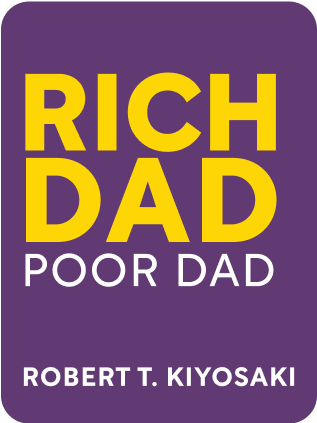

This article is an excerpt from the Shortform summary of "Rich Dad Poor Dad" by Robert T. Kiyosaki. Shortform has the world's best summaries of books you should be reading.
Like this article? Sign up for a free trial here .
What are the Rich Dad, Poor Dad lessons? What can you learn from these different philosophies?
The Rich Dad, Poor Dad Lessons revolve around making the right decisions to lead to financial independence. Rich Dad, Poor Dad lessons offer financial knowledge as well as advice on how to think about money.
Rich Dad, Poor Dad Lessons
These Rich Dad, Poor Dad lessons can help you understand how you can make money without being trapped in the rat race, always competing for more while still under someone else’s control. Use the Rich Dad, Poor Dad 6 lessons to achieve financial independence.
Lesson 1: The Rich Don’t Work For Money – Money Works for Them
One of the first Rich Dad, Poor Dad lessons is that the rich don’t get rich merely by being paid higher salaries (though this is a great help). They get rich by owning things that make them more money.
Wealthy people use their Income to buy Assets that return more Income. Meanwhile, they minimize their spending on Expenses and buying Liabilities, to have more money to buy more Assets.
People who don’t become rich either spend all their income on expenses, or buy liabilities that increase their expenses but don’t add income.
The key to financial independence is having money that makes more money. You want your money to make enough money that you don’t have to work anymore.
Lesson 2: Buy Assets, Not Liabilities
The key is to buy things that generate income (assets). You do NOT want to buy things that lose money over time or incur large expenses (liabilities). This is number two of the Rich Dad, Poor Dad lessons.
This is obvious enough. But the most deceptive investments look like assets, but are actually liabilities.
- Example: buying a house as your primary investment. This viewpoint is problematic because it gets people to buy more house than they really need. A more costly house vacuums up money with high monthly expenses – money that could have been put more profitably elsewhere.
Real assets are businesses that don’t require your active management; stocks, bonds, and other securities; income-generating real estate; and intellectual property generating royalties.
Think about each dollar as your employee that works 24 hours a day tirelessly to make you more money.
The tradeoff between today’s expenses and future income should be clear. Every dollar you spend today is a dollar that does not work for you again, in perpetuity.
Lesson 3: Reduce Taxes through Corporations
Kiyosaki advises that people set up corporations to deduct expenses without paying taxes. (Shortform note: This is a controversial suggestion because it can easily go wrong if you don’t follow tax guidelines.)
The major thing worth noting here is that corporations let you deduct legitimate business expenses pre-tax, instead of paying from post-tax dollars. This is the fourth of the Rich Dad, Poor Dad lessons.
Lesson 4: Overcome Your Mental Obstacles
Even if you have Rich Dad goals, you still need to execute your plan. Several common mental obstacles get in the way. In the fourth of the Rich Dad, Poor Dad best lessons, you’ll learn to tackle these common mental obstacles:
Self-doubt: In the real world, more than just intelligence and grades is required. Guts, chutzpah, balls, daring, tenacity, grit are different names for the factor that plays a huge role in success.
Fear: Fear of losing makes you play it safe and avoid opportunities that can have huge upsides and relatively low downsides.
Laziness: Counterintuitively, busy people are often the most lazy. They stay busy as a way of avoiding something they don’t want to face. The Rich Dad, Poor Dad 6 Lessons each can help you conquer laziness.
Guilt for Feeling Greedy: Learn to embrace your greed. Money is empowering, and you have the right to design the future life that will make you happiest. The Rich Dad, Poor Dad 6 Lessons can help you earn wealth and believe in it.
Arrogance: When you’re ignorant in a subject, recognize this, then educate yourself. Intelligent people welcome new ideas, since new ideas add synergy with other ideas.
Lesson 5: Develop Financial Intelligence. Keep Learning
Financial intelligence consists of knowledge in accounting, investing, markets, and law. This is one of Rich Dad, Poor Dad’s best lessons.
Financial intelligence allows you to construct creative ways to solve financial problems, vet the ones that are more likely to work, then have the technical ability to execute them.
Knowledge compounds in a scary way. Making yourself 1% better each day will pay off huge returns compared to someone who stays static. And the faster you can iterate your knowledge, the faster the returns compound. This is one of the Rich Dad, Poor Dad best lessons.
Rich Dad, Poor Dad Lesson 6: How to Get Started
Finally, we’ll end with tips on how to get started on your path to building wealth in this last of the Rich Dad, Poor Dad best lessons.
- Need a lesson greater than reality: Find a deep reason you want to succeed. If you don’t have a strong reason, you won’t make it.
- Actively choose to be rich and think every day: Ask, what would a rich person do in this situation? Invest in educating yourself.
- Choose friends carefully. Consciously make an effort to learn from them: Don’t seek people for their money. Seek them for their knowledge.
- Master a formula (a way to make money) and then learn a new one: Formulas lose their potency as they become more common. Keep reinventing yourself and finding new ways to create value.
- Pay yourself first: As described above, buy your assets first, and pay the bills last. The pressure will force you to creatively think of ways to generate more money.
- Pay your advisors and brokers well: They provide valuable information and take time to educate you.
- Buy assets that generate free money: Find a way to put in money and get it back, then get free money into the future.
- Buy luxuries with income from assets only: You must resist the temptation to spend any extra money you get. This requires fortitude.
- Find your personal hero. Emulate their behavior: Learn how they make decisions, and how they got to where they are.
- Give to others first, and it’ll come back many times over: This is true for money, a smile, love, friendship. Help someone sell something, and sales will come to you.
Rich Dad, Poor Dad Lessons can seem daunting, but the advice is simple. Through Rich Dad, Poor Dad lessons, you can start to reframe how you think about money and build wealth. Just follow the Rich Dad, Poor Dad 6 Lessons.

———End of Preview———
Like what you just read? Read the rest of the world's best summary of Robert T. Kiyosaki's "Rich Dad Poor Dad" at Shortform .
Here's what you'll find in our full Rich Dad Poor Dad summary :
- The key differences in how rich dad and poor dad approached life
- Why it's a terrible idea to buy an expensive house
- How to overcome your own mental blocks to become wealthy for life






